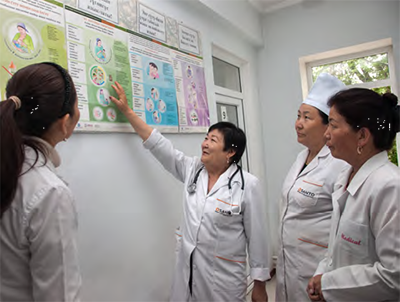SPRING/Kyrgyz Republic Project Overview
This short video is a brief overview of the work that SPRING has been doing in the Kyrgyz Republic since the project began in 2014.
This short video is a brief overview of the work that SPRING has been doing in the Kyrgyz Republic since the project began in 2014.

Today, the world faces a double burden of malnutrition, with almost three billion people suffering from either undernutrition or overweight and obesity (FAO 2013). No country is untouched.
Today’s world faces a double burden of malnutrition, with almost three billion people either undernourished, overweight, or obese (FAO 2013). The causes of this growing crisis are numerous and multi-faceted.
The Baby-Friendly Hospital Initiative (BFHI) defines global standards of optimal care for appropriate breastfeeding and mother-child bonding. Participating hospitals undergo a process of planning, training, and organizational and policy changes to achieve 10 steps.
USAID, Ministry of Health, and oblast government representatives attended the Baby-Friendly Hospital Initiative (BFHI) award ceremony for three facilities in Jalalabad on January 31, 2018. On the same day, MOH and oblast administration officials in Naryn awarded BFHI certificates to three facilities.
View the News Story here.
Micronutrient powders (MNP) are an efficacious intervention to reduce iron deficiency anemia and to fill nutrient gaps in young children, but there is limited published implementation research, which is needed as countries are increasingly implementing or scaling up programs. In 2015, SPRING held the Micronutrient Powders Consultation, bringing together 49 MNP program implementers and experts to identify and summarize the most recent MNP program experiences and lessons learned for operationalizing MNP for young children.
Global Nutrition Report, November 2017.
Immunization, family planning (FP), and maternal, infant, and young child nutrition (MIYCN) are all important aspects of primary care for women and children. There are many missed opportunities for integration which could further improve these services. To address this issue, on June 14, 2017, the MIYCN-FP Integration Working Group hosted a joint meeting with the FP-Immunization Integration Working Group to discuss ways to increase synergy and use existing platforms to integrate and strengthen global service provision.
Anemia remains a severe public health problem in Ghana, with 65.7% of children under five and 42.4% of women in reproductive age (WRA) suffering from anemia, according to the 2014 Ghana Demographic and Health Survey report (GDHS). The Northern Region is more severely affected, with 82.1% and 47.5%, respectively, of children under five and WRA suffering from anemia.
Community health workers (CHW) play a critical role in delivering evidence-based, cost-effective interventions that can improve nutrition outcomes. Information on the services that CHW provide is necessary to advocate for change in training, management, and supervision systems related to the delivery of nutrition services by CHWs but the diversity and magnitude of community health programs in a given country can make it hard to find.